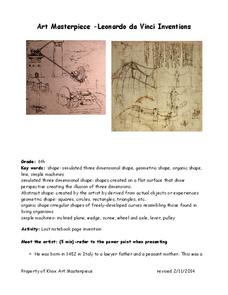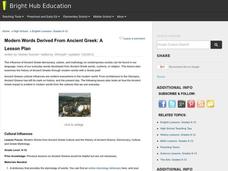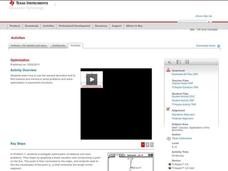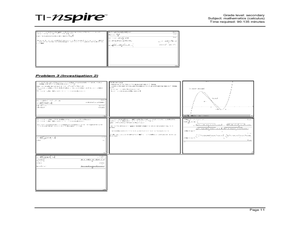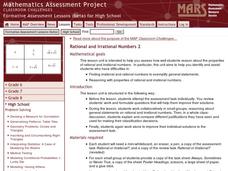Curated OER
Garbage 2: Recycling
Students apply what they have learned about throwaway products "and the valuable natural resources from which they're derived" by thinking about where garbage goes after they throw it out. They also examine their own ideas and habits...
Curated OER
Reflections of a Linear Function
Learners reflect functions about the X-axis, Y-axis, and origin. They derive equations for reflected functions using the website www.explorelearning.com.
Curated OER
Layers Upon Layers
Students model how layers of sediments are deposited. They use logic to derive rules or laws that can be used to examine layers of sediment in a cup and apply it to the real world.
Curated OER
Worksheet 18 - Spring 1996
In this math instructional activity, students practice finding the function while practicing using the Taylor series. Then they compute the second integral by parts.
Curated OER
Barehands Integration
In this calculus learning exercise, students use integration to calculate the solution of functions. They use the correct notation and formula to calculate where the derivative is constant. There are 10 questions.
Curated OER
More of DeMoivre's Theorem
Students identify DeMoivre's Theorem. In this precalculus lesson, students derive the law of sine and cosine as it relates to DeMoivre's Theorem. They identify the best time to use these formulas.
Curated OER
Trig is SOH Easy!
Students derive the six trigonometric identities. In this trigonometry lesson, students review the parts of a right triangle and use the Pythagorean theorem as a guide to find the trig identities. They find sine, cosine and tangent ratios.
Chandler Unified School District
Art Masterpiece—Leonardo da Vinci Inventions
After getting to know the inventor, Leonardo da Vinci and his many inventions, scholars think up their own invention. Following a written description and a hand-drawn picture, learners use a method of mirror writing and antiquing to give...
Curated OER
Curve Sketching
In this calculus worksheet, students identify the point of increase and decrease on a graph. They analyze the curve of a graph using the derivative. There are 10 open questions about derivatives.
Curated OER
Related Rates Problems: An Application of Implicit Differentiation and the Chain Rule
In this related rates problem worksheet, students use the chain rule and implicit differentiation to solve related rate problems, such an writing an expression relating to the ripple of a circle. This three-page worksheet contains...
Curated OER
Reflections of a Linear Function
Students identify and reflect functions about the X-axis, Y-axis, and origin. They derive equations for reflected functions and graph the linear functions. Finally, students identify that f(x) can be reflected about each axis and the...
Curated OER
Words In The News--Chissano Wins Prize For Good African Leadership
Students read, discuss and derive vocabulary words from current events. After discussing the rigors of competition and personal experiences, students read about a prize for good African leadership. In groups, they research other...
Curated OER
Ancient Greece
Students explore the origins of modern language. For this etymology lesson, students discuss the cultural influences of Ancient Greece on modern society. Students design and complete charts that demonstrate the original and contemporary...
Curated OER
Vocabulary Match: Grade 2
In this vocabulary matching worksheet, students match vocabulary words with definitions, 16 words possible. Worksheet contains links to additional activities.
Curated OER
Related Rate Problems
For this calculus worksheet, students solve problems that involve related rates. The two page worksheet contains twenty-four problems. Answers are not provided.
Curated OER
Concavity of a Graph
Learners explore the graph of a function. For this calculus lesson, students identify when and where the graph is increasing or decreasing. They identify if it concave up or down by moving the cursor.
Curated OER
Optimization
Learners identify the critical points to a function. For this calculus lesson, students perform optimization of functions. They use the TI to create a visual of the graph.
Curated OER
Pendulum Motion
Students explore questions which cannot be handled with simple pendulums, and examine both the usefulness and the limitations of approximations in science. A Java applet created from a Stella model is included.
Curated OER
Two Investigations of Cubic Functions
Through learning about cubic functions, students graph cubic functions on their calculator. Students determine the local maximum and minimum points and the tangent line from the x-intercept to a point on the cubic function. Students...
Curated OER
Rational and Irrational Numbers 2
Is the circumference of a circle always, sometimes, or never rational? Learners answer questions individually and also work in groups to look at sums and products of rational and irrational numbers. They must also be able to use the...
Curated OER
Rational and Irrational Numbers 1
You'll need scissors, glue sticks, and mini whiteboards for this activity on rational and irrational numbers. Learners work in groups to classify a variety of expressions as rational or irrational. They are also given a mock discussion...
Curated OER
Analyzing Congruence Proofs
Looking at numerous examples of triangles, each with different properties, geometers develop their understanding of congruency. They use the notation of a counter-example to disprove certain conjectures and prove geometric theorems and...
Curated OER
Fossil Fuels (Part II), The Geology of Oil
More of a mini-unit than a lesson plan, these activities lead inquisitors through a survey of oil deposits. In the first part, they read about and view diagrams of sedimentary rock layers that trap oil. Next, they test porosity and...
Curated OER
Unit 2: Post-Revolution: The Critical Period 1781-1878
The post-Revolutionary Period of 1781-1787, also known as the Critical Period, is the focus of a series of lessons that prompt class members to examine primary source documents that reveal the instability of the period of the Articles of...









